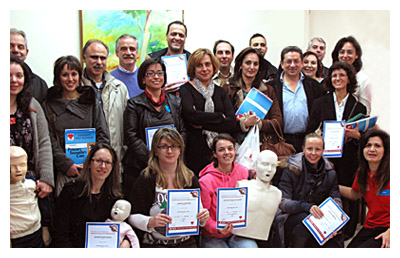Even doctors keep their first aid skills fresh!

In late December, First Aid Greece organised a special training course in Athens for Greek doctors and nurses.
25 medical professionals
from IKA, the national health organisation of Greece, attended the course.
The large group was made up of a variety of cardiologists,
pathologists, gynaecologists, orthopaedists, urologists, dentists, dermatologists, neurologists, eye surgeons and nurses.
By delivering a Basic Life Support training course, First Aid Greece were able to reinforce the importance of good quality
CPR (Cardiopulmonary Resuscitation) and AED (Automated External Defibrillator) use in the treatment of Cardiac Arrest.
The course provided an opportunity for the doctors to refresh their skills based on the latest resuscitation guidelines
produced by the European Resuscitation Council.
Leading First Aid Instructor, Fotini Teneketzi and a team of 5 assisting instructors delivered an in-depth, all
day course which was well received by all participants.
The doctors were trained using the latest HeartSine AED trainers providing realistic scenario practice.
Additionally, Prestan manikins were used to hone CPR skills through the use of audible and visual feedback
for correct chest compression rate and depth. All participants were required to meet high standards by demonstrating
their skills in realistic scenario assessments and additionally, pass a written exam.
Ms Teneketzi commented..
At first, you might think that teaching a doctor first aid is comparable with teaching
an athlete to run. However we must consider the huge variety of specialisation that exists in the medical world with
relatively few doctors employed on emergency care duties where CPR and AED skills are required constantly.
Basic CPR and AED skills although important to have, are not required by the majority of doctors in their everyday
working life. Additionally, resuscitation guidelines change regularly based on research on what works best, therefore
the need for regular refresher training and technique practice is essential.
This group of doctors and nurses must be commended on taking this step, particularly as it was
self-funded.
It is fair to say that doctors are perceived by the general public as the experts in medical matters and therefore
should be role models, emphasising the importance of learning first aid and keeping skills up to date by openly
attending regular first training sessions to set a good example.
Expanding their client base to include doctors for first aid training is a great achievement for First Aid
Greece and indeed Greece itself and reinforces the company’s “Preparation for Life” crusade in taking an active
role in the continual improvement of health and safety for the people of Greece.
First Aid Greece will continue to promote the
importance of first aid training and spread the message that anyone can, and should, help make a difference in any emergency situation.